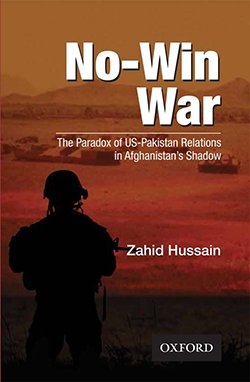
A blog of the Indo-Pacific Program
On April 29th, the Wilson Center hosted Zahid Hussain, an author and journalist and former Wilson Center Pakistan Scholar, for the launch of his new book, ‘No-Win War.” Michael Kugelman, Deputy Director and Senior Associate for South Asia, sat down with Hussain to discuss the book and how the Pakistan-U.S. relationship has been shaped by this forever war.
The discussion began with Hussain setting the stage on what the U.S.-Pakistan relationship looked like on the eve of the U.S. intervention in October 2001. He highlighted how the relationship was strained in 2001, as soon after the Soviet withdrawal from Afghanistan in the 1990s Pakistan and the United States went their separate ways. From being close allies in the 1980s, the two countries took divergent routes. Hussain elaborated how a mere few days before 9/11 occurred, there was disagreement between the United States and Pakistan intelligence agencies regarding the Taliban. Pakistan supported the Taliban and did not consider them a threat, much to the dismay of the United States. Two days later, the entire dynamic changed when the United States was attacked by the global terrorist group called al-Qaeda. Hussain stated how it became obvious that the United States was going to war in Afghanistan, and at that time Pakistan’s support was critical owing to its geographical proximity and history. Pakistan had no choice but to side with United States, and this signaled the beginning of a new phase of their relationship. All of a sudden, U.S. sanctions on Pakistan—imposed in the late 1990s after Pakistan tested nuclear weapons—were lifted and Pakistan became a key ally of the United States. While the relationship remained strained regarding how to handle the Taliban, there was mutual agreement on action regarding Al-Qaeda.
Kugelman identified a few key moments early in the war that impacted both the trajectory of the war and U.S.-Pakistan relations in December 2001 (two months after the U.S.-led began). These were the Bonn Agreement (a diplomatic initiative intended to establish the first post-Taliban government), and the Tora Bora operation (a failed attempt in the Tora Bora mountains of Afghanistan to apprehend Osama Bin Laden, the head of al-Qaeda). Hussain spoke about the implications of both of these events. He highlighted how the Bonn Agreement was a challenge, where all anti-Taliban groups had to assemble together, putting aside their own differences in order to agree to an interim agreement. Furthermore, during the Tora Bora operation, Pakistan was providing logistical support to the United States through the use of three military bases within Pakistan, and yet the United States did not take Pakistan into confidence regarding its Tora Bora operation. When Tora Bora happened, Pakistan came to know about it from other sources before it found out the news from the United States itself. As a result of Tora Bora, a lot of Al-Qaeda members fled into Pakistan through the porous border.
The event discussion then fast-forwarded to a seminal year for the war, and for the U.S.-Pakistan relationship. This was 2011. The year featured the height of the U.S. troop surge in Afghanistan, with the highest number of U.S. forces in Afghanistan at any time during the war. The United States was doing everything possible to tame the Taliban insurgency. But anger was building up in Washington about Islamabad’s support for the Taliban. Speaking to the implications of this year for Pakistan-U.S. relations, Zahid Hussain highlighted how it underscored the differences between the United States and Pakistan over the issue of counterinsurgency.
Furthermore, two situations caused further tensions between the two countries: the Raymond Davis situation and the capture of Osama Bin Laden. In 2011, a CIA contractor named Raymond Davis killed two Pakistani men on a busy street in the city of Lahore. This resulted in friction between the two countries, which lasted a month, with the United States refusing to recognize that Raymond Davis was affiliated with the CIA. Eventually, the situation resolved when money was paid to the victims’ families and the United States agreed to pull all CIA operatives out of Pakistan. Furthermore, the United States then captured and killed Osama Bin Laden, an operation that was planned without the Pakistani state’s knowledge. This resulted in an awkward situation for Pakistan. What allowed the relationship to work during this time, Hussain noted, was the backchannel contacts that helped diffuse tensions.

Further speaking about the 2011 tensions, Zahid Hussain highlighted that despite these tensions, there was still a lot of cooperation that was occurring at the time. Also, when Barack Obama took office, Washington was convinced that there could only be a military solution to the war in Afghanistan. However, after 2011, the United States realized there needed to be a political dialogue and that war could not be the solution. Pakistan was critical in bringing Taliban to the negotiation table. It was easier to get Taliban to agree to talk to United States, as they had always been interested in talking with the United States, but not with Afghanistan.
Kugelman then referred to 2014, the year the United States ended its formal combat mission in Afghanistan and transitioned into its training and advising mission, which has remained in place until today. As to whether this decision was appreciated by Pakistan, Zahid Hussain talked about how there was a difference of opinion regarding the transition. He suggested that the biggest blunder made by the Obama administration was publicizing a deadline for the U.S. withdrawal to the Taliban, as the Taliban could then simply sit and wait for the withdrawal. He referenced a famous quote by a Taliban leader who had said that while America has the watch, the Taliban have the time. They could simply wait out the United States.
Zahid Hussain mentioned another source of disagreement between the two countries—the policy of training Afghan forces to take responsibility for fighting the Taliban after the withdrawal by the United States. There was disagreement on how effective this policy would be, and concern regarding the disintegration of Afghanistan if left to itself. Pakistan was worried that the United States leaving Afghanistan without a political settlement would cause problems for both Afghanistan and Pakistan.
In speaking about Pakistan’s role in the current Afghan peace process and how it can be helpful in pressuring the Taliban to reduce violence, Zahid Hussain pointed out how Pakistan’s role in facilitating talks was very significant. However, Pakistan still cannot dictate terms for the Taliban, as despite having some influence over the group it is bound by limitations. For example, initially, Taliban leaders were based in Pakistan, which gave Pakistan some leverage, but later on that influence started receding when the Taliban leadership started operating in Doha. While Pakistan can continue to exercise some influence in the peace talks, its influence is continuously receding, according to Hussain.
Kugelman then asked what the future of the U.S.-Pakistan relationship could look like after U.S. forces complete their withdrawal from Afghanistan. Furthermore, he questioned if there is a possibility of continued counterterrorism cooperation between the United States and Pakistan. Hussain highlighted how U.S.-Pakistan relations have become merely transactional, with there not even being a semblance of what the relationship looked like in previous years. Pakistan, he said, has only been seen by the United States through an Afghanistan lens, which has formed the pivot of their entire relationship post 9/11. Furthermore, he highlighted how changing geopolitics will play an important role in the future relationship of both countries. In the past several years, Pakistan has developed a closer relationship with China, and the United States has grown closer to India, and these developments have been a major source of strain for the U.S.-Pakistan relationship. While Pakistan would like to have better relations with the United States, Hussain said, the challenge lies in balancing relations with both United States and China simultaneously.
Hibah Sheikh is a graduate student at the University of Maryland and an Asia Program staff intern.
Follow the Asia Program on Twitter @AsiaProgram. or join us on Facebook.
The views expressed are the author's alone, and do not represent the views of the U.S. Government or the Wilson Center. Copyright 2020, Asia Program. All rights reserved.
Author

Indo-Pacific Program
The Indo-Pacific Program promotes policy debate and intellectual discussions on US interests in the Asia-Pacific as well as political, economic, security, and social issues relating to the world’s most populous and economically dynamic region. Read more





